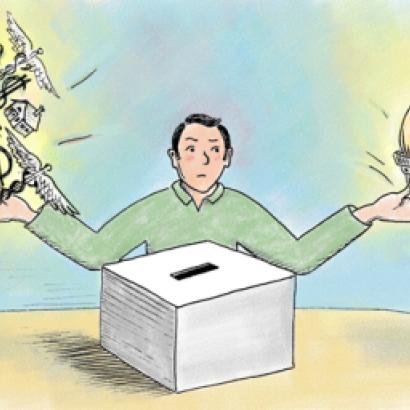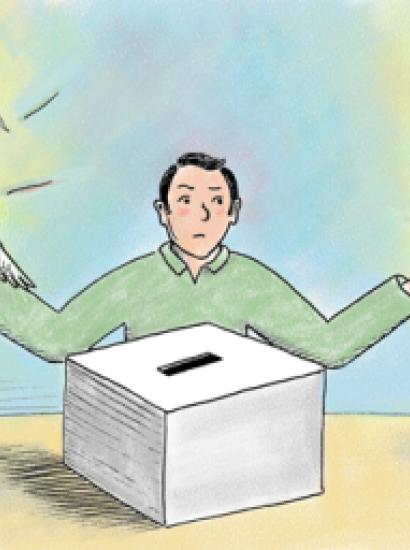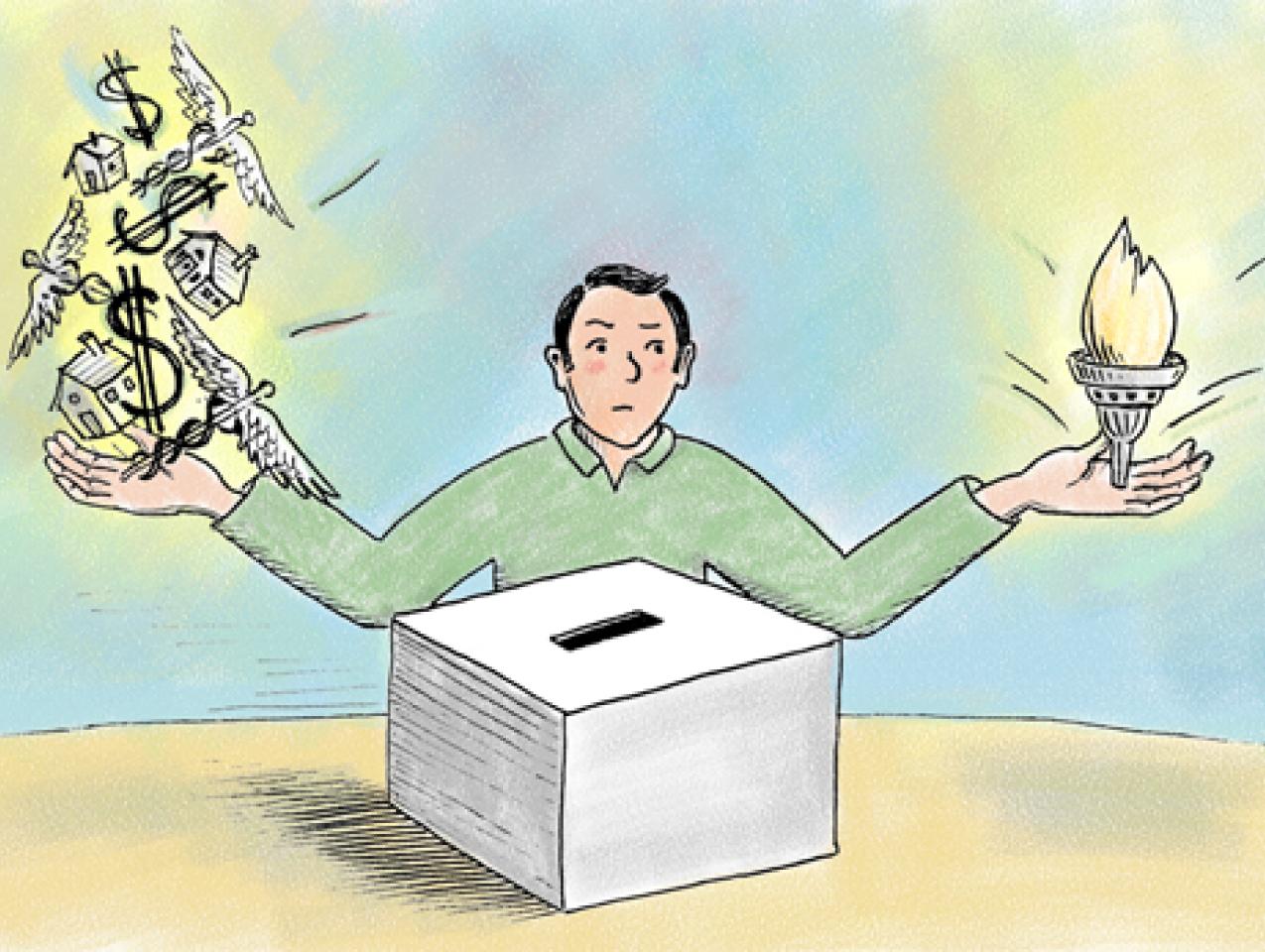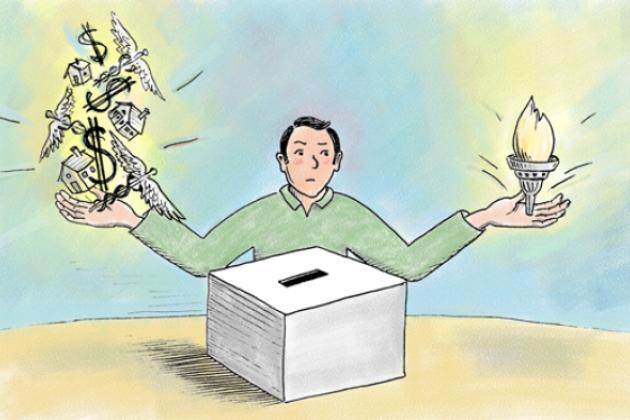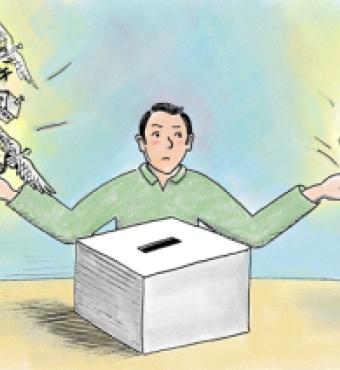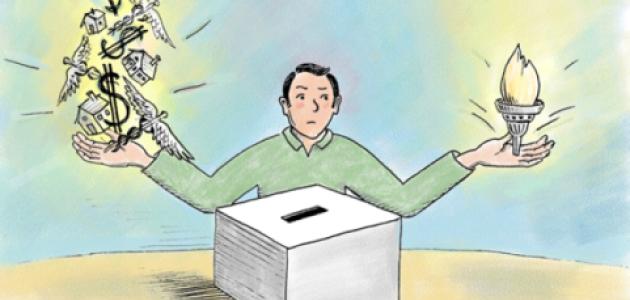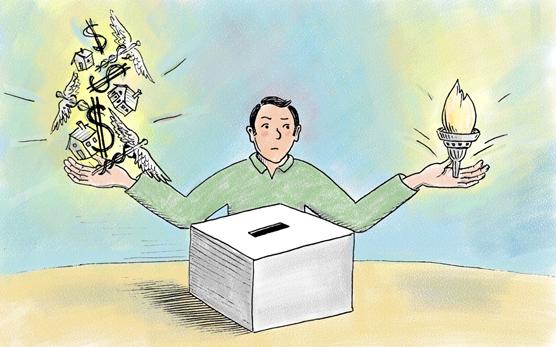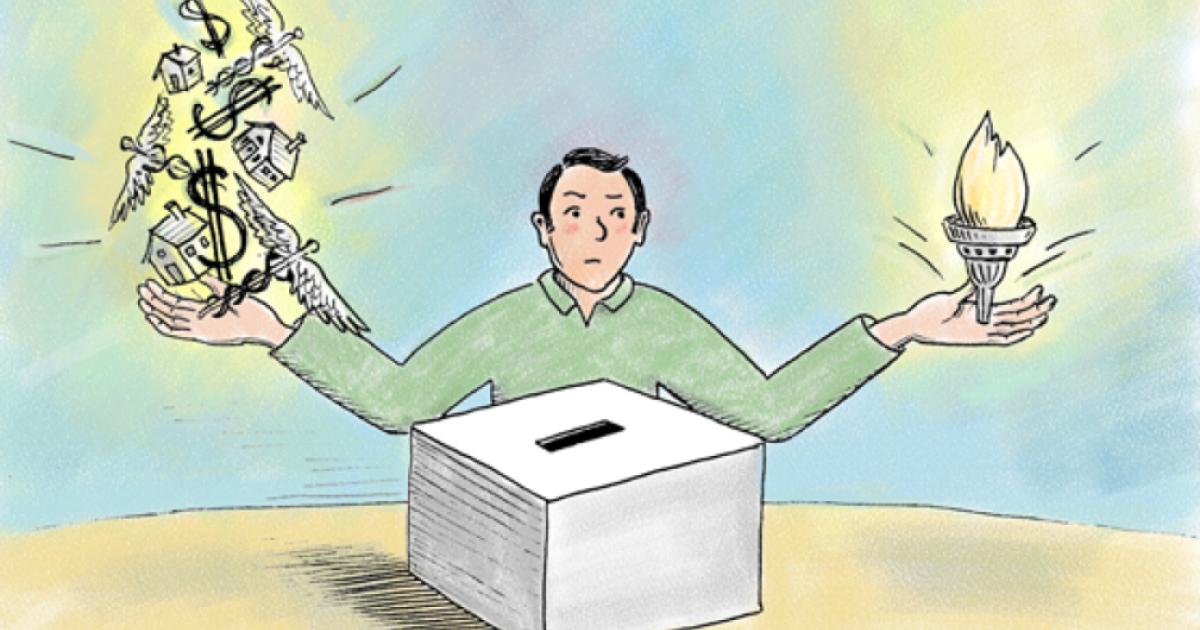- History
- Politics, Institutions, and Public Opinion
- Law & Policy
- Civil Rights & Race
Ancient Athens birthed both democracy and its most penetrating critics. The fundamental contentious issue was whether average people had the ability to manage the state and determine its proper interests, policies, and goals. For the defenders of democracy like the philosopher Protagoras, the politikê technê—i.e. the skills and knowledge necessary for coexistence in a community—belongs to all men by nature. Otherwise, no community could even exist. It would degenerate into a Hobbesian war of all against all. For its critics like Aristophanes, Plato, and Thucydides, radical democracy empowered people who did not have the skills or virtues necessary for seeing beyond their immediate private interests and desires in order to choose policies that benefitted the state as a whole, both in the present and the future.
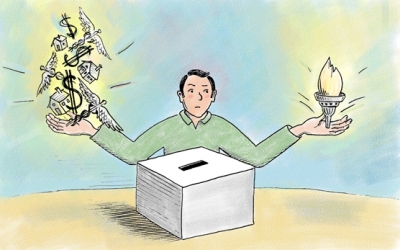
Illustration by Barbara Kelley
On the whole, the American Founders agreed with these critics of democracy. The founders rejected democracy for the same reason they rejected monarchy and oligarchy: given that, as Alexander Hamilton wrote, "men are ambitious, vindictive, and rapacious," these irrational appetites and passions inherent in human nature, when concentrated in one governing faction, would cause each to degenerate into oppression and disorder if left unchecked. Fearing this outcome, the founders created a republican mixed government like that of ancient Sparta or Rome as described in the work of the Greek historian Polybius. "The balance of a well-ordered government," John Adams wrote, "will alone be able to prevent that emulation [rivalry for power] from degenerating into dangerous ambition, irregular rivalries, destructive factions, wasting seditions, and bloody civil war." Thus the Constitution established a monarchical executive, an oligarchic Senate, and a democratic House of Representatives, each empowered to balance the other and forestall the inevitable decline into tyranny each alone would undergo if it possessed too much power.
Will voters make decisions that are necessary for the long-term health of the country?
The excesses of ancient Athenian democracy and its near destruction at the hands of Sparta made the founders particularly wary of direct democracies, which as James Madison wrote, "have ever been spectacles of turbulence and contention; have ever been found incompatible with personal security or the rights of property; and have in general been as short in their lives as they have been violent in their deaths." By empowering people no matter how lacking in virtue, character, or knowledge, democracy gives greater scope to their irrational appetites, leaving them vulnerable to factional strife or the demagogue who promises them the gratification of their desires at the expense of freedom and political order. Then democracy becomes "ochlocracy," a "mob rule" that descends into tyranny: "For the mob," Polybius writes, "habituated to feed at the expense of others, and to have its hopes of a livelihood in the property of its neighbors, as soon as it has got a leader sufficiently ambitious and daring, being excluded by poverty from the sweets of civil honors, produces a reign of mere violence. Then come tumultuous assemblies, massacres, banishments, redivisions of land; until, after losing all trace of civilization, it has once more found a master and a despot."
Though this may seem like a dusty political philosophy lesson, remember that the United States has evolved perilously close to the sort of direct democracy that would have horrified the founders. In addition to certain constitutional changes such as the 17th amendment’s direct election of senators—which subjects that body more directly to the short-term selfish interests of constituents—more recent developments in communication technology are altering the nature of our republic. Daily polling, the blogosphere, and the 24-7 news cycle have exposed politicians to incessant pressure from fickle public opinion. The growth of special-interest lobbies, also empowered by those same developments in communication technology, has made it easier for political leaders eager for reelection or private gain to pursue short-term economic and political advantage at the expense of long-term planning and the collective good. And the evolution of "democracy" into an unexamined, self-evident good sidelines the traditional criticisms of democracy that so influenced the American Founders.
In the next few years our country will be a sort of laboratory in which these old ideas about the dangers of democracy will be put to the test. Particularly worrisome is the increasing inclination to see the state not as an object of collective affection, duty, and loyalty in which individuals find some measure of their identities and meaning, but rather as a mere dispenser of entitlements that each faction tries to control for its own benefit. This weakness of democracy was apparent at its birth in ancient Athens. By the middle of the 4th Century B.C., an Athenian citizen could expect some form of state pay practically every day of the year, such as a stipend for attending the Assembly, serving on a jury, or attending a festival. Meanwhile, the citizen’s responsibility to manage the state and its military was given over to professional generals and politicians.
Demosclerosis is the modern expression of the dangers of direct democracy.
More dangerous than the abdication of civic duty is the threat of violent revolution to enrich one’s faction, as when Polybius speaks of the democratic "mob" as "habituated to feed at the expense of others, and to have its hopes of a livelihood in the property of its neighbors"—a hope that is made real by violence. Traditional criticisms of democracy that influenced the American Founders invariably focus on its tendency to sacrifice the good of the state in order to redistribute wealth by expropriating it from others, whether through manipulation of the machinery of government or through violence.
In our own day, violent revolution is unlikely. But expansive and expensive entitlements managed and dispensed by government bureaucracies achieve the same end using democratic means: the redistribution of wealth at the expense of the long-term planning and policies needed for civic and economic well-being. The clash of numerous competing factional interests as they enrich themselves via such government transfers of wealth has led to what journalist Jonathon Rauch in 1994 called "demosclerosis."
"By definition," Rauch explains, "the government's power comes from its ability to reassign resources, whether by taxing, spending, regulating, or simply passing laws. But that very ability energizes countless investors and entrepreneurs and ordinary Americans to go digging for gold by lobbying government. In time, a whole industry––large, sophisticated, professionalized, and self-serving––emerges and then assumes a life of its own. This industry is a drain on the productive economy, and there appears to be no natural limit to its growth. As it grows, the steady accumulation of subsidies and benefits, each defended in perpetuity by a professional interest group, calcifies government. Government loses its capacity to experiment and so becomes more and more prone to failure." Demosclerosis is the modern expression of the dangers of direct democracy that the founders feared.
The present crisis of entitlement costs––$2.4 trillion in 2011––and the burgeoning government debt needed to pay for them give force to Rauch’s analysis. According to the Heritage Foundation, if the country stays on its present course, by 2050 the national debt will hit 344 percent of GDP, while by 2080 spending on Social Security, Medicare, Medicaid, and the Obamacare subsidy program will reach 24.2 percent of GDP, a sum that will consume all federal tax revenues (assuming the amount of taxes collected averages 18 percent of GDP).
Americans know that Medicare is in trouble. But they don't want to do anything about it.
Yet despite this swiftly advancing economic catastrophe, Representative Paul Ryan’s proposal to reform Medicare, the only specific plan to appear so far, is not popular with most Americans. According to a CNN poll, just 35 percent favor Ryan’s plan, while 58 percent oppose it. And even though the plan does not apply to anyone over 55 years old, 64 percent of those over 65 oppose it. Still, Americans do recognize that Medicare is in trouble—but they do not want to do anything about it: a CBS News poll finds that 53 percent believe that Medicare needs fundamental changes, while 58 percent say it should continue functioning as it does now. This cognitive dissonance applies to entitlement spending in general. A Bloomberg poll finds that 49 percent of those polled are more worried about Republican cuts to entitlement programs, while 40 percent are more worried about Democrats maintaining current spending levels.
The practical political fallout of these conflicting attitudes was apparent in the May special election in New York’s 26th Congressional District, a traditional Republican stronghold. Democrat Kathy Hochul won in part because her opponent, Jane Corwin, had endorsed Representative Ryan’s plan. During the campaign, Corwin was cast as eager to reduce entitlements in order to give tax-breaks to the rich. Lurid ads appeared in which a Ryan look-alike pushed an old lady in a wheelchair over a cliff. This was not a far cry from Paul Krugman’s hyberbolic assertion that Republican calls for budget cuts "are literally stealing food from the mouths of babes."
President Obama, for his part, legitimized these scare tactics. In April, he called the Ryan plan a "vision that says America can’t afford to keep the promise we’ve made to care for our seniors," and claimed that seniors would have to pay $6,000 more for health care in order to finance "tax cuts for the wealthy."
Will the New York special election, with its Mediscare tactics, be a harbinger for 2012? The debt and economic growth will surely be on the electorate’s mind. But more profoundly, the 2012 elections will be a referendum on democracy itself, a contest between Plato and Protagoras. It will show whether a critical mass of American voters are able to see beyond their own private interests and make decisions that, while causing themselves some pain, are nonetheless necessary for the long-term fiscal health of the country—or whether, consistent with the ancient critics of democracy and the fears of the founders, they will choose instead a government that uses its power to benefit those who are, as Polybius put it, "habituated to feed at the expense of others, and to have [their] hopes of a livelihood in the property of its neighbors."
I read your article The United States of Entitlements, and I agree with it.
I want to point out though, that most people hold the view that the choice posed to them is: Medicare as is currently known, or nothing at all. Thus, they are willing to cling to the devil they know, and admit it will go bankrupt, rather than vote for a vast unknown which to them is so far not clearly defined or easy to envision.
If the next vote is a choice between a government handing out entitlements versus a country with vast personal liberties, then the people representing the personal liberty side have to paint a crystal clear picture of what they envision to replace Medicare and exactly how it will work. At the same time, it must be made perfectly clear that Medicare will not be sustainable much longer in its current form.
The next election will be heavily dependent upon effective messaging. I hope you continue to write as I think you are good at it.
---Peter Jensen








